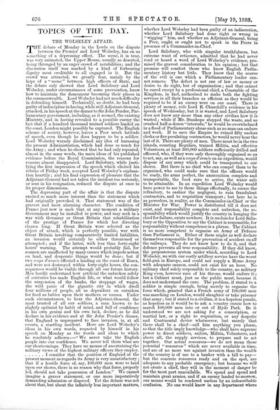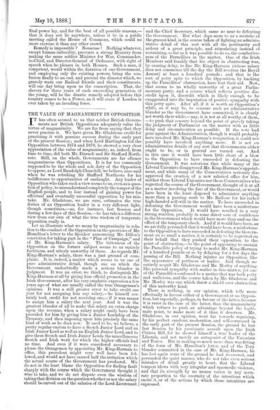TOPICS OF THE DAY.
THE WOLSELEY AFFAIR.
debate of Monday in the Lords on the dispute Tibetween the Premier and Lord Wolseley, has on us something of a depressing effect. The scene, it is true, was very animated, the Upper House, usually so deserted, being thronged by an eager crowd of notabilities ; and the discussion itself was marked by a kind of forbearing dignity most creditable to all engaged in it. But the crowd was attracted, we greatly fear, mainly by the hope of a " scene " between high officers of State, and the debate only showed that Lord Salisbury and Lord Wolseley, under circumstances of some provocation, know how to maintain the demeanour becoming their places in the commonwealth. Lord Wolseley had not much difficulty in defending himself. Technically, no doubt, he had been guilty of indiscipline in having, while still Adjutant-General, attacked, in his speech at the dinner to Sir John Pender, Par- liamentary government, including, as it seemed, the existing Ministry, and in having revealed to a possible enemy the fact that if a hundred thousand trained soldiers landed on the coast, London might possibly be captured. The English scheme of society, however, leaves a Peer much latitude of speech, even though he does happen to be a soldier. Lord Wolseley warmly disclaimed any idea of harassing the present Administration, which had done so much for the Army ; and, when he showed that he had only repeated, almost in the same words, the main ideas of his published evidence before the Royal Commission, the reasons for censure almost disappeared. Lord Salisbury, while justi- fying the first impression of the speech which elicited his rebuke of Friday week, accepted Lord Wolseley's explana- tion heartily ; and his final expression of pleasure that the Adjutant-General had not taken the incident too seriously, or sent in his resignation, reduced the dispute at once to its proper dimensions. The depressing part of the affair is that the dispute excited so much more interest than the statement which had originally provoked it. That statement was of the gravest and most alarming character. The condition of France just now is such that at any moment a military Government may be installed in power, and may seek in a war with Germany or Great Britain that rehabilitation of the prestige of France for which her directing classes long. If Great Britain were selected as the object of attack, which is perfectly possible, war with Great Britain involving comparatively limited liabilities, an invasion would certainly be either threatened or attempted ; and if the latter, with less than forty-eight hours' warning. The attempt would probably fail, for seamen are unaffected by many causes which impede action on land, and desperate things would be done • but if two corps d'armile effected a landing on the coast Of Essex, and were not destroyed within forty-eight hours, the con- sequences would be visible through all our future history. Men hardly understand how artificial the unbroken safety of centuries has made English life, or what would follow the suspension of the banks, the stoppage of wages, the wild panic of the gigantic city in which dwell four millions of people, all as dependent on outsiders for food as babies upon their mothers or nurses. Under such circumstances, to hear the Adjutant-General, the most trusted of all our soldiers, a man known to be slightly optimist by habit of mind, and full of confidence in his own genius and his own luck, declare, as he did declare in his evidence and at Sir John Pender's dinner, that England is unprepared to face invasion, is, at all events, a startling incident. Here are Lord Wolseley's ideas in his own words, requoted by himself in his speech on Monday as the words and ideas to which he resolutely adheres :—" We never take the English people into our confidence. We never tell them what are our shortcomings. They have no means of ascertaining the military views of the highest military officers they employ. I consider that the position of England at the present moment as regards its Army is very unsatisfactory ; that if a hostile force of, say, 100,000 men were to land upon our shores, there is no reason why that force, properly led, should not take possession of London." We cannot imagine a graver statement, or one more imperatively demanding admission or disproof. Yet the debate was not about that, but about the infinitely less important matters, whether Lord Wolseley had been guilty of an indiscretion,, whether Lord Salisbury had done right or wrong in " wigging " him, and whether an Adjutant-General, being a Peer, ought or ought not to speak in the Peers in presence of a Commander-in-Chief.
Lord Salisbury, who with singular truthfulness, but. extreme want of reticence, admitted that he had never read or heard a word of Lord Wolseley's evidence, pro- mised the gravest consideration to his opinion ; but that promise will comfort those who know English Parlia- mentary history but little. They know that the source of the evil is one which a Parliamentary leader can- not remove. The defect is not one of law or money or desire to do right, but of organisation ; and that cannot be cured except by a professional chief, a Constable of the Kingdom, in fact, authorised to make both the fighting services in all their branches as efficient as they would be required to be if an enemy were on our coast. There is plenty of money, vide Lord R. Churchill's evidence in his speech of Wednesday, but it is wasted, and Lord Salisbury does not know any more than any other civilian how it is wasted ; while if Mr. Stanhope stopped the waste, and so, crushed half-a-dozen "interests," he would be overwhelmed in a flood of Parliamentary abuse such as no man can endure and work. If to save the Empire he ruined fifty useless clerks or five peculating contractors, he would never hear the last of it. There are plenty of men. There must be in the two. islands, counting Regulars, trained Militia, and effective Volunteers, at least 300,000 soldiers sufficiently drilled and. officered, who, if they were only thoroughly organised so as to act, say, as well as a corps d'arm4e on an expedition, would dispose of any army which could be transported to our shores. But there is no chief who can compel them to be organised, who could make sure that the officers would be ready, the arms perfect, the ammunition complete and. transportable, the food sure to arrive, the water safe to be attainable. In an expedition Lord Wolseley would have power to see to those things effectually, to coerce the refractory, to cashier the negligent, to ruin fraudulent contractors, and to requisition transport ; but here he is as powerless, in reality, as the Commander-in-Chief or the Minister for War. Power is distributed till it does not exist, and responsibility complete and unbroken, the re- sponsibility which would justify the country in hanging the chief for failure, exists nowhere. It is useless for Lord Salis- bury or the Opposition to say the Cabinet is responsible, for responsibility without competence is a phrase. The Cabinet is no more competent to organise an Army of Defence than Parliament is. Either of them might as well declare themselves responsible for the prevention of accident on all the railways. They do not know how to do it, and that defence prevents all true responsibility. If they did know, the preposterous system under which, according to Lord Wolseley, we with our costly artillery service have the worst field-gun in Europe, and could not supply a Home Army with adequate cannon, could not exist for an hour. No. military chief solely responsible to the country, no military King even, however sure of his throne, would endure it ; but a Cabinet must, just as the public must, because it does not understand the cure. The problem, if stated to a soldier is simple enough, being merely to organise the force which, granted that a French army of 100,000 men was marching on London, would slaughter or take prisoner that army ; but if stated to a civilian, it is a hopeless puzzle, as hopeless as it would be to ask a country curate how to march 100,000 men into or out of Hyde Park. Be it understood we are not asking for a conscription, or martial law, or a right to requisition, or any despotic and Continental device whatsoever, but merely that there shall be a chief—call him anything you please, so that the title imply knowledge—who shall have supreme power to direct soldiers, sailors, Militia, Volunteers, and above all, the supply services, to prepare and to act together. Our actual resources—we do not mean those potential " resources " which are never available in time, and are of no more use against invasion than the wealth of the country is of use to a banker with a bill to pay— but the concrete resources ready and on the spot, are adequate to any probable emergency; but because we will not create a chief, they will in the moment of danger be for the most part unavailable. We spend and spend and maintain great armies, and if an enemy landed to-morrow, our means would be rendered useless by an indescribable confusion. No one would know in any department where final power lay, and for the best of all possible reasons,— that it does not lie anywhere, unless it be in a public meeting called the House of Commons, which could no more exercise it than any other crowd. Remedy is impossible ? Nonsense ! Nothing whatever, except human imbecility, prevents a strong Ministry from making the same soldier Minister for War, Commander- in-Chief, and Director-General of Ordnance, with right of speech when he pleases in both Houses. Such a man, if competent, would within the duration of one Government, and employing only the existing powers, bring the con- fusion finally to an end, and prevent the disaster which, we gravely warn our Radical friends and their constituents, will one day bring upon us the conscription. That, the slavery for three years of each succeeding generation of the young, will be the drastic remedy adopted before this country ceases to be a Power, as it will cease if London is ever taken by an invading force.



































 Previous page
Previous page